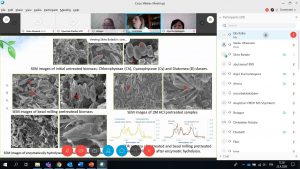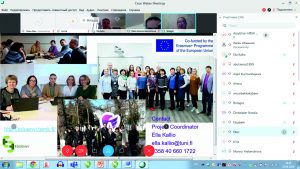On April 23, 2020, within the framework of the International Scientific- Practical Conference “Auezov Readings – 18: Spiritual Heritage of the Great Abai”, devoted to the 175h anniversary of Abai Kunanbayev, the international webinar on section 10 “The contribution of the Erasmus + Program to Improving the competitiveness of universities and their integration into the world scientific space” was held. The webinar was attended by 40 people from universities in different countries, such as Finland, Spain, Denmark, Russia, Kazakhstan. The moderator of the webinar organized by the participants of the project «585761-EPP-1-2017-1-FI-EPPKA2-CBHE-JP Enhancing Competences of Sustainable Waste Management in Russian and Kazakh HEIs / EduEnvi on the basis of M. Auezov SKSU, was Botagoz Mutaliyeva, candidate of chemical sciences, Associate Professor of the “Biotechnology” department. The purpose of the webinar was not only to disseminate the results of the project, but also to exchange experience in the field of education and science, to reveal the pressing problems of the modern world.
Ella Kallio presented a report prepared jointly with colleagues from the Tampere University of Applied Sciences, Finland, and KazNU named after Al-Farabi, Kazakhstan, where she shared the results of piloting the project courses, with the developing online pedagogy in the field of sustainable waste management in Kazakh and Russsian HEIs.
The results of the course development within the framework of the project were made by Almira Saparbekova, Ph.D., Associate Professor of the “Biotechnology” department, and Aigul Kurmanbaeva, Associate Professor of Sh. Ualikhanov KokSU, who shared the results of a sociological survey conducted with respondents regarding the sorting of municipal solid waste in the Kokshetau city, as well as the need to improve environmental literacy of the population.
Scientists from the University of Applied Sciences in Odense, Denmark, Elizabeth Agerbek and Ellen Houmoller made a presentation on the importance of professional training of the future teachers for innovative activities in the field of education, making young adult students aware of their potential and encourage and motivate them to develop their competencies is a challenge for both teachers and the learners themselves.
Silvia Bolado and Pedro Garcia from the University of Valladolid, Spain, shared with the results of their scientific research in the field of biotechnology, namely, with study of the effect of pretreatments and enzymatic hydrolysis on cell wall of microalgae grown in piggery wastewater treatment plants to optimize downstream processing.
Colleagues from Russia, from the “ITMO national research University, St. Petersburg, Russia, such as Sergeeva I., Kovalenko B., Orlova O., Dinkelaker N. made a number of reports, such as the disclosure and solution of a number of problems of distance and online learning, which cause a need in connection with the relevance of the modern world, researches of entrepreneurship in the digital economy, study of the protective function of aquatic vegetation communities of the Gulf of Finland of the Baltic Sea with regard to the conservation of the quality of abiotic components of local coastal ecosystems, as well as investigation of heaby metals content in wild berries and mushrooms at various distances from industrial facilities.
Themes of reports of Professor Sergei Polbitsyn from Ural Federal University named after the First President of Russia B. N. Yeltsin, UrFU, Russia, as well as Dmitry Rudenko from Tyumen State University, Russia, were associated with the problems and opportunities of science and education, with institutional aspects in the study of municipal waste management in educational programs. Perizat Parmankulova from M. Auezov SKSU drew the attention of the audience to the creation of an inclusive environment for distance learning for people with disabilities, and that the courses of the EduEnvi project can be applied to such people.
An interesting report was made by teachers from Shymkent Nazarbayev Intellectual School of Chemistry and Biology, Shymkent, Kazakhstan, Assylzhan Zhunuskhojayev, who spoke about the Microsoft Teams platform is an effective for organizing distance and online learning in educational institutions, and Mira Beisenova, who highlighted the topic related to the development of students critical thinking by use of STEAM training elements at project works creation.
Thus, many issues were discussed at the webinar, especially in light of the application of innovative technologies in the field of education, science, etc.


